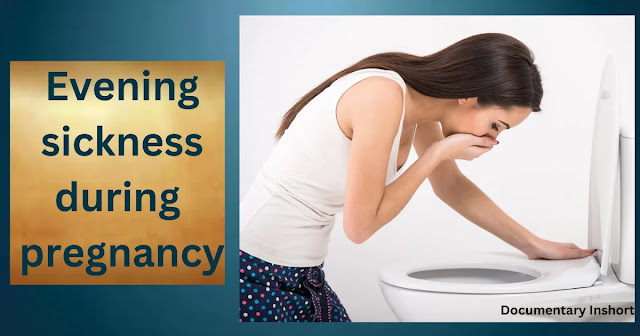Evening sickness during pregnancy | Reduce Evening Sickness
Understanding Evening sickness
If you are facing nausea or vomiting during your pregnancy journey, then please don't panic, it's absolutely normal. My heading indicates evening, but to your knowledge, it has nothing to do with evening. This evening sickness or I can say pregnancy-related nausea or vomiting can occur at any time of the day. But if you are saying that it happens to you only in the evening, then it can be because of the same routine you follow every day.
Approximately 70% of the women suffer from nausea or vomiting during their pregnancy journey. It usually starts in the sixth week, peaks between the eighth and eleventh week, and then declines towards the end of the first trimester (3rd month).
Causes and triggers
- Hormones like HCG and estrogen rise during pregnancy, these hormones also affect the digestive system and can significantly contribute to sickness like nausea and vomiting.
- It is advisable in pregnancy, never to keep your stomach empty. During pregnancy hormone changes can make your insulin sensitive and it can lead to low blood sugar in your body and ultimately a nausea feeling.
- If you are stressed and fatigued, then also evening sickness can happen.
- An empty stomach also triggers nausea. During pregnancy, the digestion process becomes slow and if you are empty stomach too, it can heighten your acidity and take you in the direction of nausea.
- Strong odors in the evening, whether they come from cleaning, cooking, or other sources, can make you feel queasy.
- Every individual has a unique physiology, so the response to the same stimuli can be different. Some people might just have a higher risk of getting evening sickness due to their particular physiological make-up and some don't.
Tips for relief
- If you keep your blood sugar level stable then you avoid one of the reasons for evening sickness. To maintain your blood sugar level, please try to eat something light in the late afternoon like yogurt or fruit.
- As dehydration also triggers nausea, so, please start drinking an adequate amount of water and keep yourself hydrated all day.
- If you think that there is any particular food or its smell, or any kind of aroma which triggers your sickness, then avoid it too.
- If you think that you do not fall into either of the above remedies and still you are facing sickness, then I recommend ginger. You can consume it in any way you want like through tea or candies.
- Getting fresh air also reduces the chances of nausea
- If you lay down immediately after eating, then it can also trigger nausea. So, after eating either you can remain upright for some time or you can walk too.
comfortable night's sleep despite evening sickness.
- Lay down on your left side, this can not only reduce the feeling of nausea but also improve the blood flow towards the placenta.
- Make a bedtime routine that informs your body that it is time to relax. You can do it by doing gentle exercises, reading books, and having a warm bath.
- Always sleep in a ventilated room.
- Please try to avoid food before bed, which triggers your nausea. Also don't eat heavy food at night.
- Avoid caffeine including food items, as it can alter your sleep cycle.
When to call the doctor
If you are pregnant and suffering from consistent nausea, and also if you have the following symptoms, then there should be an immediate call to your doctor. Those symptoms are:-
- nausea that lingers all day, making it difficult to eat or drink
- throwing up three or four times a day, or being unable to hold food in the stomach
- brown-colored throw up, or throw up with blood or blood splatters in it; lose weight; feel lightheaded or faint;
- less frequent urination than normal
-a rapid heartbeat
-an abundance of headaches
- excessive fatigue
Hope you love this article, you can let me know about the concern thing through the comments.















Post a Comment